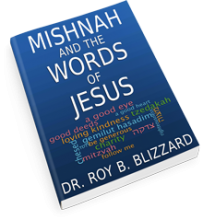Mishnah and the Words of Jesus

One of my first exposures to Hebraic thought was a book by Dr. Roy Blizzard and David Bivin called, Understanding the Difficult Words of Jesus. I still have this little book and still recommend it to people who are new to these things. After fifteen years from my first exposure to his work, it’s good to see him producing new titles. Mishnah and the Words of Jesus (MWJ) is one of several works which he has recently released. This particular title caught my attention, because I have been studying the relationship between the words of Yeshua and that of the sages for a number of years now. Once I learned that it was focused around tractate Avot, my anticipation increased even though it was only 57 pages.
The work begins with his explaining of some of the terms he will be using, along with a brief history of the Mishnah, the Tosefta, the Talmud and various other rabbinic sources such as Mekhilta, Sifra and Sifre. From there he discusses what he considers to be “the outstanding, overriding, and yet simple, theme of Jesus” — that of tzedakah (“charity”). He uses this term in the broader sense of gemilut hasadim (which he actually addresses), and comments that it “is the most comprehensive and fundamental of all Jewish social virtues. It encompasses the whole range of the duties man has toward his fellow man” (p. 19). If you are familiar with Dr. Blizzard’s teachings, you know he is one who does not pull punches. He often makes observations which may not settle well for those whose theological position he addresses. He does, however, bring much-needed correction to traditional Christian understanding of the teachings of Jesus for those who can bear it. One of the over arching themes he addresses is the undue emphasis on heaven by most Christians. He says,
“The gospel of the kingdom is not a message about getting to go to heaven. It is not a message for the hereafter, or the world to come… Biblical faith is very much a religion of today; whereas western Christianity developed along the lines of the oriental mystical religions of that day which were other-worldly. The desire was to escape this physical body that entraps us and to ascend to another-worldly state of nirvana, or paradise — Christianity’s ‘pie-in-the-sky by-and-by’. But that is not biblical faith” (p.21–22).
This small work packs in quite a bit. MWJ reads more like an audio transcript than a written work, filled with colloquialisms and personal anecdotes. Not only does Dr. Blizzard touch on the bulk of mishnayot contained in Pirkei Avot, but he offers sound advice in practical areas of spiritual living. For example, when commenting on chapter two, mishnah 11 (mishnah 16 in Pirkei Avot), which deals with the yetzer hara (the “evil impulse” or “the flesh”) he says,
“Much of what we attribute to demons is simply the yetzer hara, and if we want victory over it, we are not going to get it by going through deliverance 49 times. The way to get victory over those things that afflict and hinder is by taking control and bringing it into subjection to the yetzer hatov. It necessitates repenting and turning from it. It is an action that comes from within us. Unfortunately, most people want the easy way out” (p.44).
These quotes are but a small sampling of the gems contained in this small work. Although one may not agree with every premise, MWJ fills a needed void for comparative studies which address practical principles for living, rather than merely academics.








